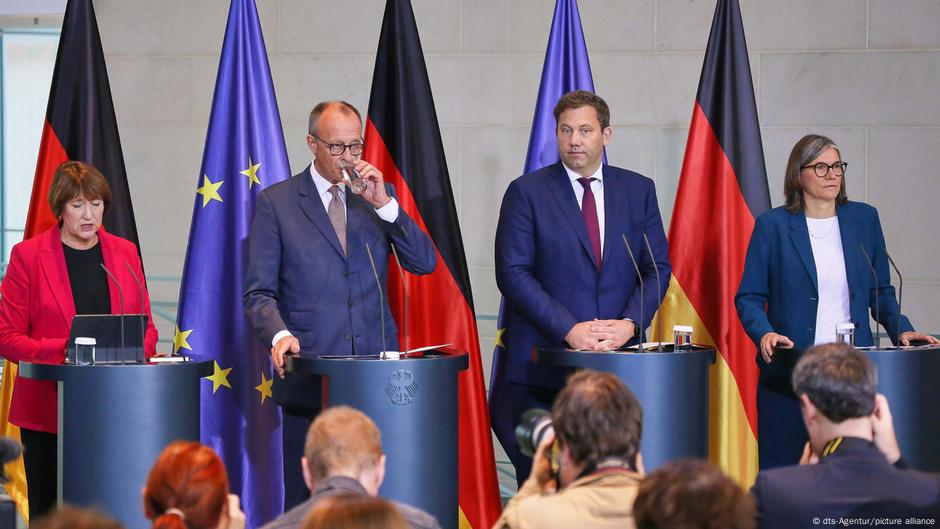Chancellor Friedrich Merz said he would oppose the "hard cutoff" currently planned by the EU, aiming to stop registering new internal combustion engine cars by 2035. The goal was already under review and looking fragile.
German Chancellor Friedrich Merz spoke out against the EU’s current goal of phasing out new cars with internal combustion engines by 2035, only allowing the registration of new all-electric vehicles by that date.
Merz was speaking at a summit with other German political leaders and leading representatives of the country’s struggling car industry.
“Such a hard cutoff in 2035 will not take place, if I have anything to do with it, and I will do all I can to achieve this,” Merz said in Berlin.
Activists from Greenpeace and Fridays for Future were waiting outside the chancellery in Berlin on Wednesday, protesting as top politicians and auto executives gathered for the talks.
Deputy Chancellor Lars Klingbeil, a member of the Social Democrats and so the leading representative of Merz’s junior coalition partner, had also signaled a willingness for changes to the plans.
In particular, he cited cars like plugin hybrids, so-called range extenders (fuel-powered generators used to augment an electric motor and battery pack with a fraction of the fuel needed to power a traditional engine) and those using innovative fuel mixtures.
Merz and Klingbeil also both stressed plans to continue and intensify incentives for electric car buyers. These include continuing road tax exemptions and a new scheme to incentivize purchases that they said would be tailored to lower-income car buyers, with electric cars still more expensive than average and the cheapest ones from China subject to hefty tariffs in the EU.
Germany is scrambling to try to prop up its renowned car industry, which has been struggling with increased competition from China, decreased demand for cars in general in Europe, new barriers to trade in the US and China, and an array of other issues as well as the transition toward electric motoring.
More than 50,000 jobs were lost in the car sector in Germany in 2024, a recent study found.
To view this video please enable JavaScript, and consider upgrading to a web browser that supports HTML5 video
The EU set the target of registering no new fuel-powered cars as of 2035 in 2022. Many industry leaders have voiced doubts in the feasibility of the proposal.
The EU itself was already racing to review the policy plan, perhaps with an eye to compromise.
Electric cars remain more expensive than petroleum-fueled vehicles, with serious limitations like their range and charging times. Beyond that, longer-term issues like the real-world lifespan of their battery packs, the cost of replacements, and the environmental costs of disposal or recycling are still only partially understood.
Their market share is growing in Germany with the help of incentivization schemes, but still only 19% of new car registrations were BEVs (battery electric vehicles, like those set to still be permitted in 2035) in August of this year, according to the CleanTechnica specialist news site. Another 11.6% were plug-in hybrids. Most of these cars also sit in the higher price bands, out of many consumers’ reach.
To view this video please enable JavaScript, and consider upgrading to a web browser that supports HTML5 video
The co-chair of Germany’s Greens, Katharina Dröge, criticized Thursday’s announcement, saying it effectively doomed the legislation at the EU level.
“Merz and Klingbeil are de facto canceling the EU’s internal combustion engine end in 2035,” Dröge said. “This is a fatal and short-sighted decision, which is bad for the jobs in the car industry and terrible for climate protection.”
She said backing away from the plans would unsettle consumers and investors alike, and accused the government of endangering the car industry by “artificially” keeping outdated technologies alive.
However, arguably the Greens’ most successful and longstanding politician, Winfried Kretschmann — state premier of Baden Württemberg, home to both Mercedes and Porsche — welcomed the decision, saying “the goal of 100 percent electromobility by that point is not achievable.”
“Hybrids will be needed temporarily as a bridging technology,” he said.
The state premier of Lower Saxony, home of Volkswagen also welcomed the news.
“Now that was a good car summit,” Social Democrat Olaf Lies exclaimed of a regular German meeting of politicians and business with something of a reputation for ending with more of a whimper than a bang.
He said it was important to continue promoting electric vehicles and also argued that hybrid vehicles should play a role for longer than the decade that’s currently foreseen.
The chairwoman of the IG Metall trade union said the auto summit “gave us some confidence,” saying that the dramatic situation in the industry had shown the need to raise voices and confront Brussels.
A group of companies whose name could translate as Climate Economy (KlimaWirtschaft) was more critical of the plans.
“Instead of powerfully beating the drum for German electric cars, undecided car buyers are being unsettled by this debate on green fuels and range extenders and their passion for electric motoring is being taken away,” the group’s chairwoman Sabine Nallinger said.
Edited by: Wesley Rahn











